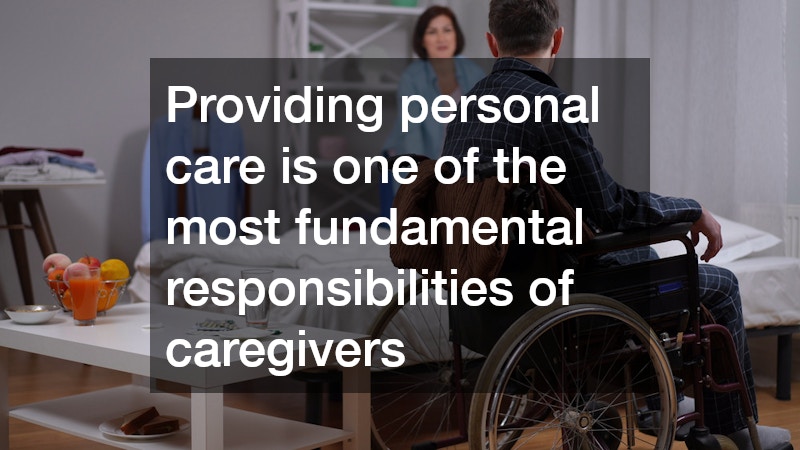Caregivers play an indispensable role in the lives of those needing assistance, providing not just physical support but also emotional and social care. Understanding the diverse responsibilities and challenges they face is crucial for effective caregiver-client relationships.
Key Responsibilities
Personal Care Assistance
Providing personal care is one of the most fundamental responsibilities of caregivers. This includes helping clients with daily activities such as bathing, dressing, and grooming.
It’s crucial for maintaining hygiene and boosting the client’s self-esteem. Effective personal care goes beyond the basic tasks. It involves being sensitive to a client’s privacy and dignity, ensuring they are comfortable and respected during such intimate tasks. Moreover, personal care assistance can be tailored to meet individual preferences and needs, ensuring that caregivers foster trust and a positive rapport with their clients.
Medication Management
Medication management is essential in maintaining a client’s health, especially for those with chronic conditions. Caregivers ensure medications are taken correctly and on time. Accurate record-keeping and understanding of each medication’s side effects and interactions are vital. This ensures any potential issues are identified quickly. Caregivers often work closely with healthcare professionals to update medication schedules and address any changes in the client’s health status.
Meal Preparation and Diet Monitoring
Proper nutrition is integral to the overall well-being of clients. Caregivers are often responsible for preparing meals and monitoring dietary needs. This involves not only cooking balanced meals but also considering food preferences, allergies, and dietary restrictions. Regular collaboration with nutritionists or dietitians can enhance meal planning, ensuring clients receive the best possible nutritional support.
Mobility and Transportation Support
Many clients require assistance with mobility to move safely within their homes and community. Caregivers help with walking, transferring, and positioning. Transporting clients to locations such as medical appointments or social activities is also often necessary, and caregivers must ensure safety and comfort during transit. Supporting mobility contributes to a client’s independence, allowing them to remain engaged with their community and enhance their quality of life.
Emotional and Social Support
Beyond physical care, emotional and social support are vital in helping clients maintain a sense of connection and belonging. Caregivers often provide companionship and engage with clients in activities that foster emotional well-being. Listening to clients and validating their feelings can significantly alleviate feelings of loneliness and depression. Emotional support is as important as physical care, impacting a client’s overall quality of life. Caregivers can encourage social interaction through group activities or outings, promoting a more positive outlook and enhancing emotional health.
Developing a Relationship
Establishing Trust and Respect
Building a strong caregiver-client relationship starts with trust and respect, enabling open communication and cooperative care planning. Listening intently and honoring personal preferences fosters a supportive environment where clients feel valued and understood. Consistency in actions and maintaining confidentiality further strengthens the trust bond between caregivers and clients.
Effective Communication Techniques
Open and honest communication is crucial for effective caregiving. Caregivers should strive to understand client preferences, concerns, and feedback. Utilizing clear verbal communication, supported by appropriate non-verbal cues, aids in overcoming barriers such as speech difficulties or hearing loss. Effective communication extends to explaining care procedures, which empowers clients by involving them in their care decisions.
Customizing Care Plans
Caregivers create personalized care plans tailored to each client’s unique needs, preferences, and health conditions. This individualized approach fosters better outcomes. Regularly reviewing and adapting care plans ensures they remain relevant, accommodating changes in the client’s health or circumstances. Involvement of clients and their families in care planning can enhance cooperation and satisfaction with the care experience.
Encouraging Client Involvement
Encouraging client involvement in care decisions empowers them and promotes independence, leading to a more positive caregiving experience. Providing choices in daily activities or care routines enhances client satisfaction and reinforces a sense of control over their life. Moreover, active participation in setting care goals can motivate clients, promoting adherence to care plans and improving outcomes.
Building Cultural Competency
Cultural competency is vital for caregivers to respect and incorporate clients’ cultural beliefs and practices into care delivery. Understanding and acknowledging cultural differences fosters stronger, more empathetic relationships, enhancing client comfort and trust. Continuous learning about diverse cultures equips caregivers to deliver culturally sensitive and inclusive care.
Caregivers are central to the well-being and support of individuals who require assistance, fulfilling roles that range from personal care to emotional support. Managing stress, pursuing relevant training, cultivating strong relationships with clients, and navigating financial considerations are all vital elements of effective caregiving. For those interested in this rewarding career or those requiring caregiving services, understanding these facets helps ensure the best possible outcomes in caregiving journeys.



